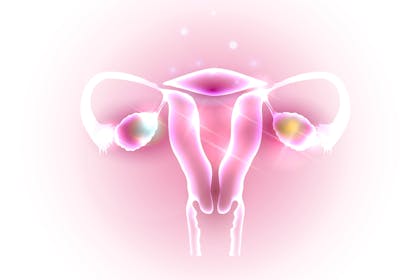Polycystic ovary syndrome (PCOS):

This page contains affiliate links, which means we may earn a small amount of money if a reader clicks through and makes a purchase. All our articles and reviews are written independently by the Netmums editorial team.
Polycystic ovary syndrome (PCOS) is a common condition that affects one in five women here in the UK. But what exactly is it? And what does it mean if you're hoping to start a family? Here's what you need to know about PCOS.
What are polycystic ovaries?
To understand what PCOS is, it helps to know what polycystic ovaries are.
'Having polycystic ovaries means that your ovaries contain about twice as many cysts as normal ovaries,' explains Verity, the national charity set up to improve the awareness of PCOS in the UK.
'The "cysts" in polycystic ovaries are actually egg-containing follicles that have not developed properly, due to a number of hormonal abnormalities.
FREE NEWBORN NAPPIES
'It was originally thought that these cysts caused the condition PCOS but we now know they are one of the symptoms of PCOS and not everyone will get them,' explains Verity.
So what exactly is PCOS?
PCOS or polycystic ovary syndrome is a common female hormone condition that affects how your ovaries work.
'Polycystic ovary syndrome (PCOS) is the name given to a condition in which women with polycystic ovaries also have one or more additional symptoms,' says Verity.
What are the symptoms of PCOS?
These can vary hugely. Although as many as 20% of women have PCOS, some will have no symptoms whatsoever.

But for others, the symptoms can affect your appearance, self-esteem and quality of life.
'Women with PCOS suffer from ovulation problems and symptoms of excessive production of male hormones. Women with PCOS do not ovulate regularly and can often experience irregular or absent periods, difficulty losing weight, various skin problems and difficulty getting pregnant,' says Professor Dr Geeta Nargund, Medical Director of Create Fertility.
Symptoms of PCOS can include:
- irregular periods or no periods at all
- difficulty getting pregnant as a result of irregular ovulation or failure to ovulate
- excessive hair growth (hirsutism) – usually on the face, chest, back or buttocks
- weight gain
- thinning hair and hair loss from the head
- oily skin or acne
How common is PCOS?
It's thought to affect around one in every five women in the UK.
What causes PCOS?
Often PCOS is linked to abnormal hormone levels including levels of insulin but the exact cause is unknown.
There is some evidence to suggest a genetic link. If female relatives have PCOS there is a higher chance that you are at risk. If you have it, there is a 50:50 chance of passing it on to your daughter.
Can PCOS be cured?
Although PCOS is treatable and the symptoms can be managed, it cannot be cured.
If I lose weight will my PCOS improve?
Losing weight can hugely improve symptoms of PCOS, particularly with excess hair growth and acne. Weight loss can also help medication work and can help make your cycle more regular.
But this does not work for all women with PCOS, especially if they do not have much weight to lose.
Can I get pregnant with PCOS?
'The good news is that more women with PCOS manage to have children than don't', says Professor Helen Mason, Formerly Professor in Reproductive Endocrinology, St. George’s, University of London.
'It can make things harder but there are lots of treatments now and we are very good at getting women to ovulate who do not do so. The main problem is again weight. The heavier you are the less likely you are to ovulate and the harder it will be to stimulate the ovaries.'
I have PCOS and am struggling to conceive - what are my options?
Professor Geeta Nargund is a fertility expert. Here she talks about treatment options if you have PCOS and are struggling to get pregnant:
'Ovulation problems associated with PCOS can be successfully treated with a short course of ovulation induction tablets taken at the beginning of each cycle, for up to six cycles.
Other treatment for those with PCOS includes:
- the injection of follicle stimulating hormones
- or IVF treatment if ovulation induction alone is not successful.
'Women with PCOS are at an increased risk of developing Ovarian Hyperstimulation Syndrome (OHSS), a condition resulting from overstimulation of ovaries that can have serious health consequences if severe. Therefore it is vital that treatment is monitored by a fertility expert and ultrasound scans to prevent any complications,' says Professor Nargund.
Can IVF help me get pregnant?
Mild IVF treatment is worth considering for women with PCOS, as results are maximised and complications minimised through lower doses of stimulating drugs.
Will losing weight help me conceive?
'Women with PCOS often experience difficulty losing weight, but even a loss of just 5% can lead to a significant improvement in symptoms and the chances of conception', says Professor Nargund.
'The right diet and amount of exercise is important when trying to fall pregnant, and even more so for women with this condition. Eating a high fibre diet and avoiding excessive amounts of carbohydrates and fatty foods is recommended, alongside regular exercise.
'The key message to women with PCOS is to lose weight if they are overweight,' she says.




